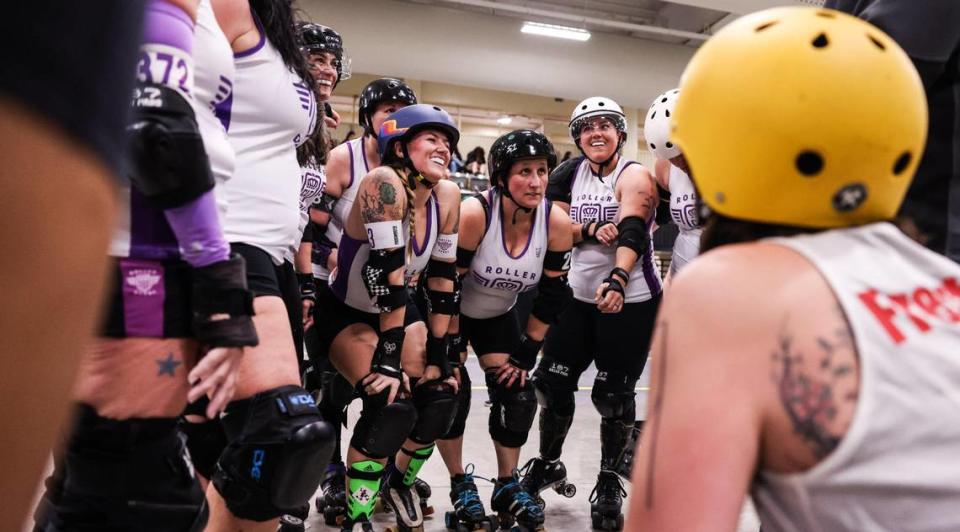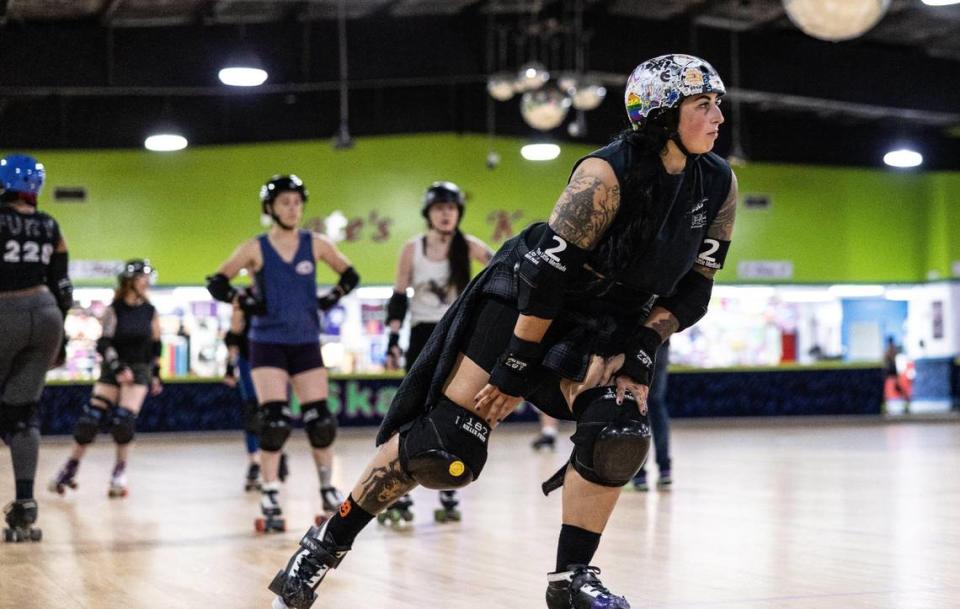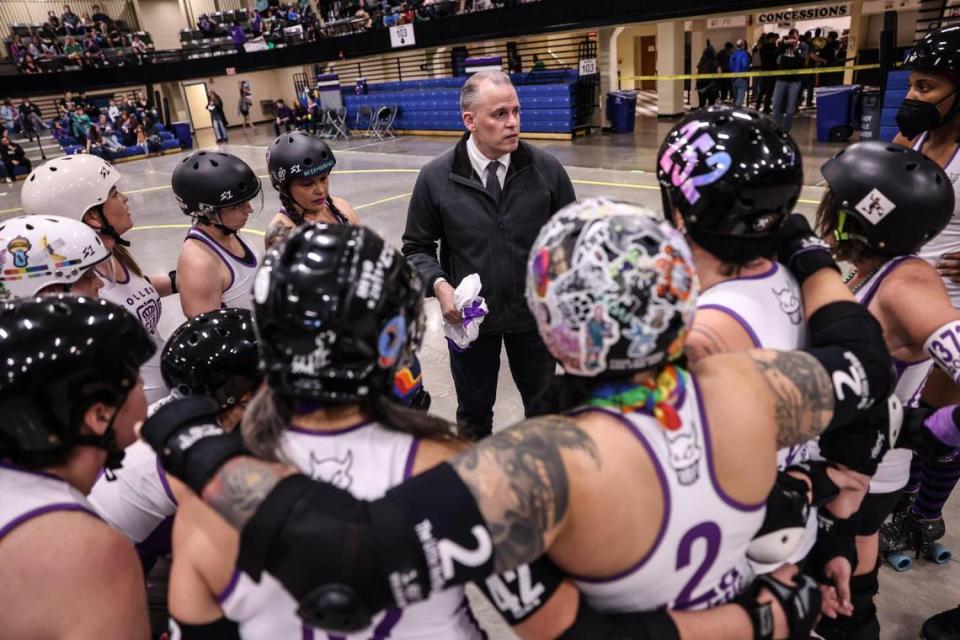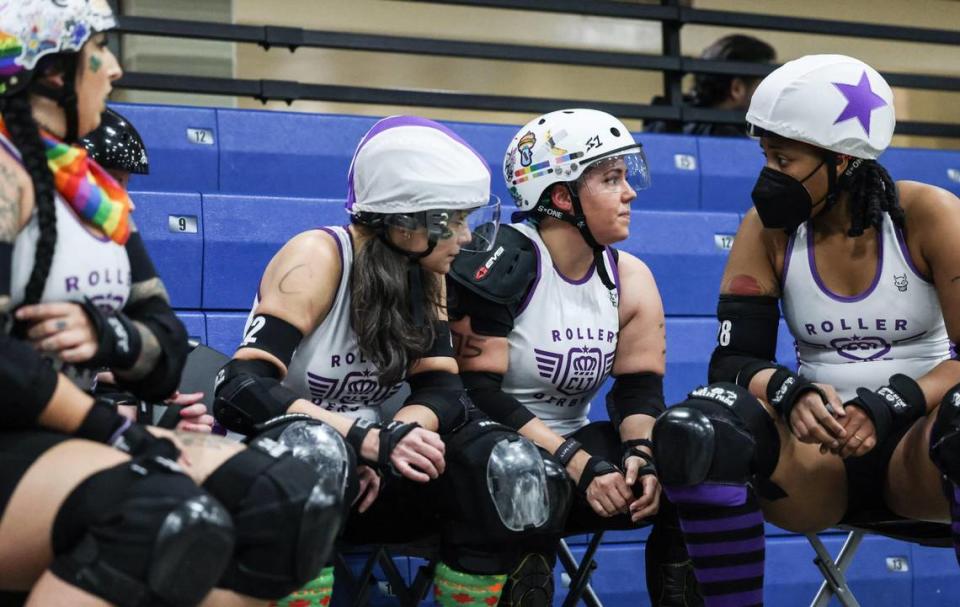Roller derby resurgence: How America’s forgotten pastime is jamming in Charlotte
It’s trivia night at your local bar, and you’re asked to name a sport that emerged in the 1930s, sold out stadiums and arenas and graced network television stations multiple times per week. Oh, and it was played by both men and women — together.
Chances are the answer “roller derby” would not roll off your tongue. But the wildly popular “rugby on wheels” was once a national — and even worldwide — sensation.
While traditional sports have since usurped roller derby’s stardom, the sport continues to be played globally, and its focus on inclusivity has remained untouched. Charlotte’s very own Charlotte Roller Derby league is a testament to that.
[READ NEXT: Beyond the track in Charlotte: How roller derby has changed the lives of its players.]
First, a little history lesson
Born out of the desperation for entertainment during the Depression, roller derby made its debut on Aug. 13, 1935, at the Chicago Coliseum. The brainchild of Leo Seltzer, a Chicago sports promoter who learned that 90% of Americans at that time owned skates, derby began as a walkathon on skates before evolving just a few years later to a full-contact, track-based game of skill.
Requiring strategy, brute strength, athleticism and a modicum of violence, roller derby teams were composed of both men and women playing on the same team, by the exact same, full-contact rules (seeing bodies flippantly tossed off the track was not an unusual sight).
It quickly grew in popularity, becoming a paid, professional sport that attracted fans around the world. In fact, more than 27,000 people packed Shea Stadium in 1973 for the triple-header world championships.
After a dip in popularity in the ‘80s and ‘90s, a group of women in Austin, Texas, resurfaced the sport in 2001 and added some flair. Taking a note from Austin’s drag and punk scenes, the league encouraged players to wear colorful, attention-grabbing outfits, don bold makeup and create clever alter egos using “punny” names like Public Jenemy, Yankee Doodle Slammy and Flanibal Lecter. The league also moved from a banked to a flat track, and teams around the world began to pop up following this model.
In 2004, the present day governing body of roller derby Women’s Flat Track Derby Association (WFTDA) was formed. Today there are 443 member leagues operating across six continents, including the Queen City’s own Charlotte Roller Derby (originally Charlotte Roller Girls). The women’s league is inclusive of trans women, intersex women and gender expansive people, the League specifies.

Rules of engagement
Derby is played with 10 players on a flat track at one time. Each team has one jammer — designated with a star on their helmet — who scores the points, and four blockers who attempt to prevent the other team’s jammer from scoring points, as well as helping to clear a path for their jammer.
The games, called bouts, are 60 minutes long and are broken into two minute jams. A point is scored for each opposing blocker that a team’s jammer passes.
Unlike the early years where limbs and bodies flew everywhere, there is no punching, kicking or throwing elbows and no contact with another player’s helmet or below the knee. As many as seven referees — four on the track and up to three outside the track — are there to make sure these rules are adhered to.
“The hardest thing for me to get used to was there are so many whistles, and it’s all happening so fast. In soccer there is one ref, one whistle, but in derby there are refs everywhere, whistles blowing, teammates yelling, music playing — its like an echo chamber,” said Sierra “BBSK8” Elrahal.

A safe, supportive and diverse environment
There is nothing universal about the players of Charlotte Roller Derby, except that they love — and feel loved — by their community.
The crowd includes teachers, bartenders, lawyers, dog walkers, stay-at-home moms, 20-somethings, 50-somethings, lifetime athletes and those who never played an organized sport in their life.
“I was joining just to have some fun on the side, stay fit and be competitive, and derby changed my life. I met some of the best friends I’ve ever had, felt part of a community like I’ve never felt before in my life. Derby became my family,” said Denise “Puck” Holden.
In addition to Charlotte Roller Derby, Holden is also part of Team North Carolina and was recruited to play for Team Greece in the Roller Derby World Cup — impressive facts on their own merit, but even more so considering the fact that she will be 56 in November.
Tami “FrogHer” Williams found derby through her daughter and knew it was something she had to do.
“Derby literally saved my life — it came to me at a time of need and brought so many incredible people into my life,” Williams said.
In fact, the community was so important to her that for three years when she belonged to a team in Appalachia, she would drive two hours each way, twice a week, just to attend practice — leaving at 5 p.m. and not returning home until midnight.
“This community is the best thing I’ve ever been a part of in my entire life. Everyone is accepted 100% for who they are, not just within our league but throughout the derby community,” Williams said.
From empowering players to come out to helping them stay sober, introducing them to their spouse to giving them a space to feel safe in their skin, roller derby is much more than just a sport, and the community is expanding.

What’s ahead for roller derby in the Queen City
Because Charlotte Roller Derby is part of WFTDA, all of its current sanctioned teams are women-identifying, but the group is hoping to start an open gender team that can also include men.
“We are actively trying to start a men’s and open gender league that would fall under the Charlotte Roller Derby umbrella, but would be part of Men’s Roller Derby Association (MRDA) instead of WFTDA. COVID slowed this down, but we now have a board position to coordinate and are hoping we get some momentum,” said Justin “JamG” Austenfeld, who, along with his skater wife, Paige “Pluto” Berkebile, has been involved in Charlotte Roller Derby for years, practicing with, reffing for and volunteering with the organization.
Train to become ‘fresh meat’ or jam out at the next bout

Charlotte Roller Derby is actively recruiting new players and is hosting a skater school to train anyone interested. Players of any gender identification and all levels are welcome — you don’t even have to know how to skate. Skater school, formerly called bootcamp, is designed to teach all of the skills needed to play, from skating posture and how to stop (an important one) to whips and checks. Registration will open Friday, Sept. 1 and run through Oct. 8. The team will also host an information session on Oct. 8 at 8 a.m. at Kate’s Skating Rink in Indian Trail.
“Bootcamp is too harsh of a word because it was more team building, teaching and learning how to be on skates,” said Elrahal, who grew up playing traditional sports, including soccer and basketball. “There are moments where you get in your head and they somehow see that and recognize that and they say, ‘Hey it is OK to fall, it’s OK to feel frustrated.’ They don’t give up on you, which helps you not give up on yourself. I hadn’t had that before playing sports.”
Once skaters have passed all of their skill assessments, they are eligible to try out for a team. In addition to the three current charter WFTDA teams, Charlotte Roller Derby is hoping to have enough players to create an open-gender team that would play under MRDA rules.
Players who don’t make a charter team are still able to join in practices and scrimmages, honing and developing their skills and being part of the derby community.
“Don’t be intimidated — come out and try it. You aren’t going to be hitting anyone your first day on skates. You’ll learn how to skate, how to fall properly, how to stop. It’s a low and slow building program that takes its time and teaches you,” said Haley “The Little Merblade” Holland.
This year’s 10-week training session will be held on Sundays, starting Oct. 15 from 7:45-10 a.m. at Kate’s Skating Rink in Indian Trail. Participants must be 18 or older. The cost for registration is $100. Equipment including helmet, knee and elbow pads, skates and a mouth guard are required, and rentals are available for an additional $25.
“We’re kind of in an age of derby. Skating became so popular during the pandemic, and there is pent up demand for new social outlets,” said Emily “Emme the Menace” Ewing.
If you are looking to see the Charlotte Roller Derby girls in action, the next bout is Oct. 7 at Grady Cole Center. Tickets will be $17 for adults and $11 for children older than 5 in advance, and $20 for entry at the door. Children 5 and younger get in free.
“It’s family. I’ve been a part of this huge family across countries and states for so long. I will literally skate until my legs don’t work anymore,” Holland said.

